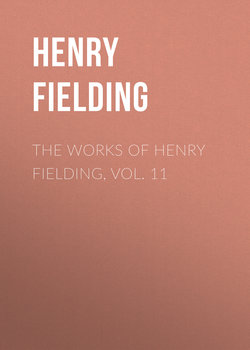The Works of Henry Fielding, vol. 11

Реклама. ООО «ЛитРес», ИНН: 7719571260.
Оглавление
Henry Fielding. The Works of Henry Fielding, vol. 11
INTRODUCTION
INTRODUCTION
BOOK I
Chapter i
Chapter ii
Chapter iii
Chapter iv
Chapter v
Chapter vi
Chapter vii
Chapter viii
Chapter ix
Chapter x
Chapter xi
Chapter xii
Chapter xiii
Chapter xiv
Chapter xv
Chapter xvi
Chapter xvii
Chapter xviii
Chapter xix
Chapter xx
Chapter xxi
Chapter xxii
Chapter xxiii
Chapter xxiv
Chapter xxv
BOOK XIX
Chapter vii
THE JOURNALOF A VOYAGE TO LISBON
DEDICATION TO THE PUBLIC
PREFACE
INTRODUCTION
THE VOYAGE
Отрывок из книги
WHETHER the ensuing pages were really the dream or vision of some very pious and holy person; or whether they were really written in the other world, and sent back to this, which is the opinion of many (though I think too much inclining to superstition); or lastly, whether, as infinitely the greatest part imagine, they were really the production of some choice inhabitant of New Bethlehem, is not necessary nor easy to determine. It will be abundantly sufficient if I give the reader an account by what means they came into my possession.
Mr Robert Powney, stationer, who dwells opposite to Catherine-street in the Strand, a very honest man and of great gravity of countenance; who, among other excellent stationary commodities, is particularly eminent for his pens, which I am abundantly bound to acknowledge, as I owe to their peculiar goodness that my manuscripts have by any means been legible: this gentleman, I say, furnished me some time since with a bundle of those pens, wrapped up with great care and caution, in a very large sheet of paper full of characters, written as it seemed in a very bad hand. Now, I have a surprising curiosity to read everything which is almost illegible; partly perhaps from the sweet remembrance of the dear Scrawls, Skrawls, or Skrales (for the word is variously spelt), which I have in my youth received from that lovely part of the creation for which I have the tenderest regard; and partly from that temper of mind which makes men set an immense value on old manuscripts so effaced, bustoes so maimed, and pictures so black that no one can tell what to make of them. I therefore perused this sheet with wonderful application, and in about a day’s time discovered that I could not understand it. I immediately repaired to Mr Powney, and inquired very eagerly whether he had not more of the same manuscript? He produced about one hundred pages, acquainting me that he had saved no more; but that the book was originally a huge folio, had been left in his garret by a gentleman who lodged there, and who had left him no other satisfaction for nine months’ lodging. He proceeded to inform me that the manuscript had been hawked about (as he phrased it) among all the booksellers, who refused to meddle; some alledged that they could not read, others that they could not understand it. Some would have it to be an atheistical book, and some that it was a libel on the government; for one or other of which reasons they all refused to print it. That it had been likewise shewn to the R – l Society, but they shook their heads, saying, there was nothing in it wonderful enough for them. That, hearing the gentleman was gone to the West-Indies, and believing it to be good for nothing else, he had used it as waste paper. He said I was welcome to what remained, and he was heartily sorry for what was missing, as I seemed to set some value on it.
.....
But Betterton said, if the text was to be disturbed, he saw no reason why a word might not be changed as well as a letter, and, instead of “put out thy light,” you may read “put out thy eyes.” At last it was agreed on all sides to refer the matter to the decision of Shakspeare himself, who delivered his sentiments as follows: “Faith, gentlemen, it is so long since I wrote the line, I have forgot my meaning. This I know, could I have dreamt so much nonsense would have been talked and writ about it, I would have blotted it out of my works; for I am sure, if any of these be my meaning, it doth me very little honour.”
He was then interrogated concerning some other ambiguous passages in his works; but he declined any satisfactory answer; saying, if Mr Theobald had not writ about it sufficiently, there were three or four more new editions of his plays coming out, which he hoped would satisfy every one: concluding, “I marvel nothing so much as that men will gird themselves at discovering obscure beauties in an author. Certes the greatest and most pregnant beauties are ever the plainest and most evidently striking; and when two meanings of a passage can in the least ballance our judgments which to prefer, I hold it matter of unquestionable certainty that neither of them is worth a farthing.”
.....